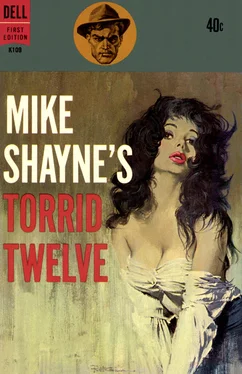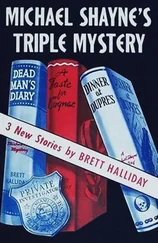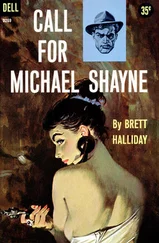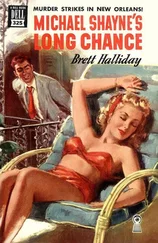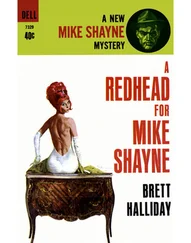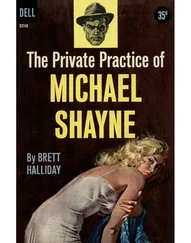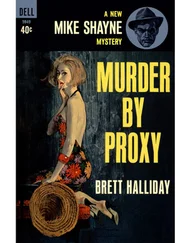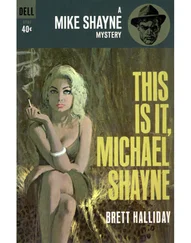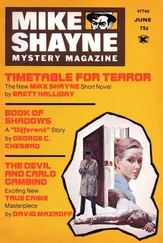Brett Halliday - Mike Shayne's Torrid Twelve
Здесь есть возможность читать онлайн «Brett Halliday - Mike Shayne's Torrid Twelve» весь текст электронной книги совершенно бесплатно (целиком полную версию без сокращений). В некоторых случаях можно слушать аудио, скачать через торрент в формате fb2 и присутствует краткое содержание. Город: New York, Год выпуска: 1961, Издательство: Dell Publishing, Жанр: Детектив, на английском языке. Описание произведения, (предисловие) а так же отзывы посетителей доступны на портале библиотеки ЛибКат.
- Название:Mike Shayne's Torrid Twelve
- Автор:
- Издательство:Dell Publishing
- Жанр:
- Год:1961
- Город:New York
- ISBN:нет данных
- Рейтинг книги:3 / 5. Голосов: 1
-
Избранное:Добавить в избранное
- Отзывы:
-
Ваша оценка:
- 60
- 1
- 2
- 3
- 4
- 5
Mike Shayne's Torrid Twelve: краткое содержание, описание и аннотация
Предлагаем к чтению аннотацию, описание, краткое содержание или предисловие (зависит от того, что написал сам автор книги «Mike Shayne's Torrid Twelve»). Если вы не нашли необходимую информацию о книге — напишите в комментариях, мы постараемся отыскать её.
Mike Shayne's Torrid Twelve — читать онлайн бесплатно полную книгу (весь текст) целиком
Ниже представлен текст книги, разбитый по страницам. Система сохранения места последней прочитанной страницы, позволяет с удобством читать онлайн бесплатно книгу «Mike Shayne's Torrid Twelve», без необходимости каждый раз заново искать на чём Вы остановились. Поставьте закладку, и сможете в любой момент перейти на страницу, на которой закончили чтение.
Интервал:
Закладка:
Her arm crept around his neck, her lips were parted, eager, her breathing uneven. She pulled his head down, her lips found his, clung to them for a long minute. Then Michael Shayne reached up, pulled her hand from around his neck, and freed himself.
“You’re a lousy actress,” he said. “You’ve never felt anything for a man in your life. That kiss was as counterfeit as the money back on the K-Three Forty-One.”
“Counterfeit!” she cried, looking at him dazed. “The money is counterfeit?”
“Just a lot of paper with green ink on it. That was something else Hugo didn’t feel was worth telling you, I guess. I’m going ashore and contact the Treasury and the Coast Guard. After that it’s in their laps. I have Hugo’s certified check. That’s going to the St. Francis Foundling Home, the way Cap Tolliver wanted. A monument doesn’t have to be in stone.”
“But what about me?” she screamed at him. “What about me?”
“That’s up to you. If you aren’t around when the Treasury men show up, I won’t go out of my way to send them after you. But you may have a lot of questions to answer if they grab you.”
“Damn you!” she screeched. “Damn Hugo! Damn all men, everywhere, forever and ever!”
She crumpled to the deck and began to sob, deep, bitter, dry sobs that racked her whole body. Shayne shrugged, found the aluminum tins of counterfeit that had come from the U-boat, and had cost the lives of seven men in the last twenty-four hours. He let himself down into the dinghy. As he rowed toward the lights of the club dock, he could hear the girl with the hungry lips — a hunger that would never be appeased — on the deck of the cruiser. She was still sobbing.
THE TOY-HEAD MAN
by FRANKLIN GREGORY
Murder that glorious April morning was farthest from Peter Ragland’s mind as he explored the miniature park outside the inn. Near the footpath, under a pink-white cloud of cherry bloom, stood a hewn stone bench. On this, a plaque proclaimed, the great Japanese Emperor Meiji in the year of his victory over the Czar had paused to rest the imperial bottom. The present occupant was neither royal nor Japanese.
He was, the approaching Peter observed with dismay, a fellow countryman. He was plump. He was of middle age and conservative dress. And for all the festive scene about him, he presented a picture of woe as he stared bleakly across the valley at the distant splendor of Mt. Fuji. In his lap rested a small carton and its torn wrapping of bright paper.
Not until Peter was nearly upon him did this dejected man glance up, and then with a start. If he seemed about to withdraw his gaze, he reconsidered; perhaps because of Peter’s manifest American look; perhaps because of inner need.
“Oh,” he said uncertainly, “was that you singing in the bath this morning?”
Peter’s frown was almost perceptible. At this remote inn, with its kimonoed maids and sliding doors of paper and wood, he’d hoped to enjoy just one holiday without tangling in the affairs of others.
Still, he mustered the civility to assent. “If you’re kind enough to call it that.”
“You carry a good tenor,” the man acknowledged. “But damn if I see what you had to sing about. Confounded Jap bath’s too all-fired hot. And privacy! Isn’t there any privacy in this wretched country?”
Peter, who did not think Japan at all wretched, replied: “Not very much. It’s pretty crowded, you know.” He had the feeling the man was avoiding some more vexing problem.
“Its worse than Times Square,” the stranger complained. “Hang it! Here I was soaking when this female traipsed in, dropped her kimono — stark naked, mind — and started soaping herself calm as you please. What are these people, immoral heathens?”
There was perplexity as well as anger in the question. Peter suppressed a grin.
“Oh, no. Amoral, perhaps. It’s just — well, to her you didn’t exist. And she imagined she didn’t exist for you.”
The stranger’s gray eyes lost some of their bleakness. “What kind of make-believe is that?” he demanded. “Can’t they face up to reality?”
Peter hesitated. It was always difficult to explain the Japanese character to Americans; especially to successful American businessmen who stood for no nonsense.
“Not reality as we know it,” he said. “But they’re very good at seeing what isn’t there.” As the man frowned, Peter added: “Look at it this way. They’ve spent centuries under harsh, suspicious masters. So naturally they’ve built up defenses — with evasion, deceit, No masks, what have you — until now it’s second nature. They don’t expect anybody to tell the truth.”
The man leaned forward, his veined hands gripping the edge of the bench.
“Good God!” And half to himself, hoarsely: “I wonder — was that why John was killed?”
Peter stared at him. But the story, front-paged in the Tokyo press the day he arrived from Taiwan, had carried the dateline of an obscure village he hadn’t recognized. He said quietly: “Then you’re John Porter’s father?”
The other, still possessed by his thought, nodded abstractedly. “Henry Porter, yes.”
When he spoke again, it was not to say anything remarkable; hardly more than the papers had printed. But in the jettisoned words, Peter got an impression of man baffled and confused, fighting for self-control.
“Toys,” he said. “But John — in the Occupation, y’know, Marine captain — liked Japan and wanted to open our own plant here.” His jaw set, reflecting original displeasure. “It’s over in the next village. Happy Delight, it’s called. Ha! But back home of course we’re Porter Play. Perhaps you’ve heard of us.”
As who hadn’t, Peter thought. In the front rank of toymakers, Porter Play, along with Marx and Gilbert. Vaguely he recalled a mention in Life last Christmas — something to do with dolls.
He ticked off what the stories had said: John Porter, 27, strangled, neck broken, found in a ravine not far from the factory. Last seen by his young wife, Minerva, leaving their home on an unannounced errand at nine the preceding evening. Mr. Porter had flown out right away; sent the body and the young wife home only last Sunday.
“A man was arrested,” Peter said.
“Tanizaki Hajime,” said Mr. Porter. “The superintendent. Of course he denied it, but he won’t say where he was. But he wasn’t home.” He added surprisingly: “A likable little cuss when John brought him to the States last year to learn our methods. And quite a lady’s man. Damn if I see him doing it. John was as big as you.”
He appraised Peter’s six feet of elastic strength with approval. “Still,” he added, “I’m told they all learned judo in the Nip army. And if he took John by surprise—”
Peter said nothing. He had his own views, gained from enough college boxing and battle combat, about a good big man being better than a good little one. But John Porter may not have been a good big one.
“And I’d had such great hopes for him. I was retiring soon. Now, well, I guess I got to take over and save what I can.” He seemed tired, very tired.
“I’ve been over there twice. Never saw such a mess. Production way off, which might be natural enough with one boss dead and the other in jail. But I think I know a calculated slowdown when I see one. And there was that strike last summer.” He added hastily: “Not over wages. We pay well enough.”
“Who’s in charge now?”
“The oyabun. I guess you know what an oyabun is. A union leader.”
Peter glanced sharply at Mr. Porter. Was it possible he did not know, or John hadn’t reported, that an oyabun was so much more?
“Big fellow named Morita Ton,” Mr. Porter was saying, and now a faint bell sounded in Peter’s memory. He was sure the name had not been connected with labor circles.
Читать дальшеИнтервал:
Закладка:
Похожие книги на «Mike Shayne's Torrid Twelve»
Представляем Вашему вниманию похожие книги на «Mike Shayne's Torrid Twelve» списком для выбора. Мы отобрали схожую по названию и смыслу литературу в надежде предоставить читателям больше вариантов отыскать новые, интересные, ещё непрочитанные произведения.
Обсуждение, отзывы о книге «Mike Shayne's Torrid Twelve» и просто собственные мнения читателей. Оставьте ваши комментарии, напишите, что Вы думаете о произведении, его смысле или главных героях. Укажите что конкретно понравилось, а что нет, и почему Вы так считаете.
